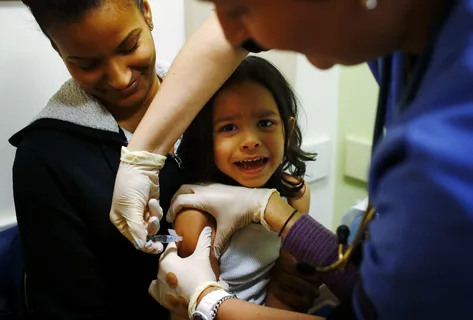This rise in vaccine hesitancy has led to a growing pool of infants and toddlers who may be at risk of contracting preventable diseases like measles.
Dr. Whitney Casares, a pediatrician and author, highlighted the dilemma faced by some parents, who, out of concern for their newborns, opt to postpone vaccinations. However, delaying vaccines can significantly increase the child’s vulnerability to various diseases.
While there is no comprehensive data on the extent of these delays, healthcare providers in California have reported a notable surge in parents requesting alternative vaccination schedules for their children, influenced partly by uncertainties surrounding COVID-19 vaccines and misinformation.
Dr. Eric Ball, a pediatrician in Orange County, noticed an uptick in parents inquiring about delaying vaccinations, seeking options beyond the standard immunization schedule recommended by the Centers for Disease Control and Prevention (CDC). Some parents prefer spreading out vaccine doses or postponing them for months or even years.
Concerns over vaccine safety and efficacy have led to a rise in parents questioning the CDC’s recommended vaccination schedule. Dr. Colleen Kraft, an attending pediatrician at Children’s Hospital Los Angeles, noted a significant increase in parents doubting vaccination schedules, with many patients falling behind due to missed appointments during the pandemic.
In response to frequent requests for delayed vaccinations, some healthcare providers have tightened their vaccine requirements. Dr. Nelson Branco from Marin County highlighted the importance of completing the primary series of vaccinations promptly to safeguard children, especially considering potential exposure to diseases like measles in public settings.
Vaccination gaps can leave children vulnerable, as evidenced by the impact of measles outbreaks in various states over the past decade. The World Health Organization emphasizes the importance of achieving herd immunity through high vaccination rates to protect vulnerable individuals in the community.
Despite a positive trend in measles vaccination rates among kindergartners in California, the resurgence of vaccine hesitancy poses a significant public health risk. Delaying childhood vaccinations not only increases the risk of disease transmission but also raises concerns about long-term health outcomes for unvaccinated children.
Efforts to educate parents on the benefits of timely vaccinations and debunk myths surrounding vaccine safety remain crucial to combating misinformation and ensuring public health protection. Pediatricians continue to advocate for adherence to recommended immunization schedules to safeguard children from preventable diseases.
Note:
1. Source: Coherent Market Insights, Public sources, Desk research
2. We have leveraged AI tools to mine information and compile it




